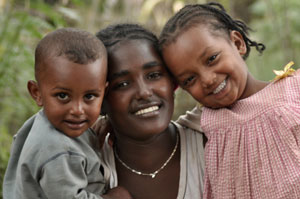Field Stories
Follow the vitamin A to an island in Bangladesh
March 12, 2025
WP_Term Object
(
[term_id] => 49
[name] => Field Stories
[slug] => all-field-stories
[term_group] => 0
[term_taxonomy_id] => 49
[taxonomy] => news-category
[description] => Discover the personal stories of people whose lives have been impacted by better nutrition, and those working tirelessly to deliver it.
[parent] => 0
[count] => 180
[filter] => raw
)
Transitioning health care delivery in Ethiopia
Genet Kebede knows the staff and volunteers who are gathered at the Kebele Meeting Hall in Welenchity, Boset Woreda, Ethiopia well.
Posted on February 15, 2012


Genet Kebede knows the staff and volunteers who are gathered at the Kebele Meeting Hall in Welenchity, Boset Woreda, Ethiopia well.
She has been bringing her son Obama Ashenafi here twice a year so he can be measured, weighed, and receive his dose of vitamin A and other life-saving health interventions. Obama was receiving these though Ethiopia’s Enhanced Outreach Strategy (EOS).
For many years, the EOS has been the main delivery systems for health interventions for children.
While it continues to be very successful at reaching many children, it relies heavily on donor funding; the same level of service provision between campaigns is not yet feasible. The Federal Ministry of Health (FMoH) in Ethiopia recognized the need to move gradually towards a less expensive and more integrated, comprehensive system that can maintain high-quality coverage year-round.
MI provided technical assistance to the government to develop their comprehensive national plan to facilitate the gradual transition of health services delivered through the EOS to delivery through the Health Extension Program (HEP) instead.
Under the HEP, Health Extension Workers in many parts of the country are now well positioned to provide health guidance and services to communities and also to encourage families to go to the health posts for regular care. Having fixed health posts with regular services through the HEP improves access to health care.
Having more consistent services will benefit Genet and her family.
“I try to bring Obama here for treatment when I can,” siad Genet. “But sometimes we have no choice but to go to the nearest private clinic, which is expensive.”
Genet will now be better able to access health care for her son on a regular basis.